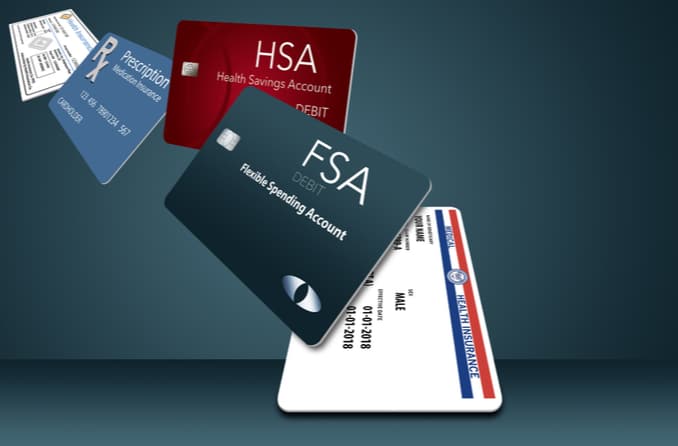What is an FSA card?

An FSA card is a debit card used to access your Flexible Spending Account (FSA) to pay for approved out-of-pocket medical expenses. Understanding your vision insurance, FSA and FSA debit card is important, as these benefits can help cover everything from routine vision checkups and corrective lenses to over-the-counter and prescription eye drops and medications.
Before we explore what kinds of products and services are eligible to be covered by your FSA card, let’s first go over what exactly an FSA card is and why it is so useful.
Flex benefits cards
Issued by an insurance provider, your FSA card goes by many names: flexible spending debit card, FSA benefits card and even sometimes the term HSA card is used interchangeably for it. An HSA does differ slightly from an FSA, so it is important to verify which type of card you have.
The first thing that you need to know about your flex benefits card is that the money that is deposited on the card from your voluntary payroll deductions is completely tax free. You could consider your contributions to your FSA card a piggy bank wherein your money can sit, untaxed, until you decide to use it on FSA eligible medical products and services.
FSA contribution limits and the IRS
As of 2020, regarding FSA contribution limits, the IRS has stated, “An employee who chooses to participate can contribute up to $2,750 through payroll deductions during the 2020 plan year. Amounts contributed are not subject to federal income tax, Social Security tax or Medicare tax. If the plan allows, the employer may also contribute to an employee's FSA.”
In October, the IRS announced that the 2021 FSA contribution limit will remain the same ($2,750). The IRS limits on FSA card contributions and regulations are subject to change, and it’s important to always be aware of current FSA card regulations by checking the IRS website for the latest information.
FSA eligible products and services
Once you have received your flexible spending credit card, you can check the balance on the card at any time. This can help you budget health expenses on a monthly and yearly basis.
The list of medical products and services on which you can use your FSA dollars covers preventive medication and supplies for nearly every medical condition.
The vision-related out-of-pocket products and services eligible for coverage by your FSA card include:
Vision exams
Over-the-counter (OTC) and prescription eye drops
Products for eye pain relief
Eye pressure monitor
Certain eye surgeries
Preventive eye care medications
Corrective contact lenses
Eyeglasses and accessories
Eyeglass repair kits
Using your FSA debit card
Your flexible spending account card works just like any bank-issued debit card works. Check your balance to ensure that there are funds to cover your purchase, and then you are ready to use it to cover your purchases. There is no paperwork to fill out or hurdles to jump through when swiping your card at the register.
Do FSA card funds expire?
Using your FSA card is incredibly easy and user friendly, but there are a few things to keep in mind if you are new to the world of flexible spending accounts.
First and perhaps most important, you can lose your contributed funds if you do not use them within a set time period. This time period varies based on provider and employer, but be sure to check with both to avoid letting your hard-earned funds expire before you can use them.
SEE RELATED: FSA rollovers
Recent changes in the way the IRS regulates FSA funds also mean that there is now more flexibility in your ability to change your contribution to the fund mid-coverage year. While this was normally not allowed unless the FSA cardholder changed their marriage or tax status, the IRS has begun loosening their formerly stricter rules on how one can manage their FSA card funds.
To find out more about how your FSA funds can be used, what items or services are eligible for coverage by your FSA card or to learn more about how to include vision care in your flexible savings account spending plan, consult your employer’s plan administrator or call the toll-free number listed on the back of your FSA card.
Page published on Monday, November 9, 2020




